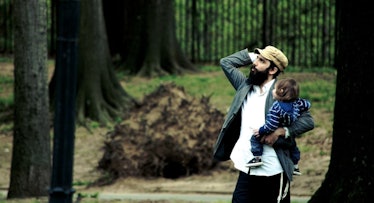Parenting Distractions Make Life Less Beautiful
Beauty requires thought.

There are few things more beautiful than the sight of a newborn baby—until a dirty diaper flies across the room, the soup boils over, and someone rings the doorbell. Is our perception of beauty really so tied to our level of focus? Perhaps, according to a new study in Current Biology. Researchers demonstrate that distractions can prevent us from experiencing the beauty around us — and that has obvious implications for busy new parents.
“Our results show that you do need focus to experience beauty, and that distraction prevents that,” co-author Denis Pelli, a professor of psychology and neural science at New York University, told Fatherly. “If you are being continually distracted by the demands of your child, or if other things in the house are distracting you from being able to interact with your child, the prevention from a sustained focus will prevent that feeling of beauty.”
Pelli and colleagues asked 62 people to indicate how much beauty and pleasure they felt from six pieces of stimuli: a teddy bear, a jolly rancher, and four images (including one self-selected beautiful image, such as a picture of a spouse). Participants rated the beauty of each object or image on a four-point scale: definitely beautiful, perhaps beautiful, perhaps not beautiful, definitely not beautiful. They were then asked to rate each object and image again, but this time while distracted by an annoying secondary task — listening to a series of letters and pressing a button when any letters repeated.
The distraction did not change how participants rated non-beautiful objects and images. But, when trying to keep tracking of repeat letters and fiddling with buttons, participants began to give lower ratings to objects and images that they had once deemed beautiful. Although the sample size was relatively small, the findings broadly suggest that philosopher Immanuel Kant’s famous claim that beauty requires thought may be spot-on.
One of the most surprising findings was that participants willingly assigned beauty to experiences and objects not often thought of as beautiful. “We were very surprised when we started hearing people describe eating jolly rancher candy as beautiful,” says study co-author Aenne A. Brielmann. When they followed up with select participants, the volunteers told them that teddy bears and candy evoked a sense of childlike nostalgia and that, for whatever reason, they found that beautiful.
Perhaps, Brielmann muses, we find newborn babies beautiful for similarly nostalgic reasons. “Anything that gives you strong pleasure can be beautiful,” she says. “When you get this strong feeling of pleasure from your child, you can experience beauty no matter what.” Now if only parents were plagued by fewer distractions.